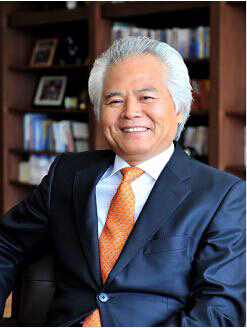Report by:

Chairman, ICAS Advisory Board
President, National Institute for South China Sea Studies

Sri Lankan Additional Secretary to the President for Foreign Relations
Cover Image Credit: Official White House Photo by Shealah Craighead
President Donald Trump attends an expanded delegation working group meeting, Friday, April 7, 2017, with Chinese President Xi Jinping at Mar-a-Lago in Palm Beach, Florida.
The Indo-Pacific Strategy (IPS) was firstly officially announced by U.S. President Donald Trump during his Asia trip in November 2017, which is a relatively new maritime-related strategy being developed and implemented by four pillar countries: USA, Japan, Australia and India. This ambitious strategy is composed of two key elements, which mainly refers to the economic integration and defense cooperation with the countries in the Indo-Pacific region. It aims at offering substantive alternative plans with sufficient financial commitment to the regional countries and thus halting the progress of China’s Belt and Road Initiative (BRI), consolidating and extending the U.S. network of partnership and maintaining its hegemony in the region, and undermining China’s relations with the states along the Indian and Pacific Oceans.
The IPS has gained currency among the so-called liberal countries, in which Japan was the main architect of the IPS.Now, the U.S. has incorporated it in their national security and national defense strategies and has found its way in U.S. legislation as well. Both Australia and India have similar views and concerns regarding China and can be seen as partners of the IPS. In the near future, economic and military cooperation and expansion would be expanded and deepened between the four countries. This could have potentially very negative consequences for China. In addition, ASEAN wants to keep its ‘Centrality’ in IPS and integrate China’s BRI with IPS, so as to maximize economic benefits and minimize security threats.
As a primary target of the IPS, China would be challenged by its implementation. Economically, the IPS would compete with the BRI, thus undermining the Chinese economic presence in the region. Politically, the Sino-U.S. relationship would be tested, and China’s relations with regional states, which mainly includes Japan, Australia and India, as well as the littoral countries of the Indian Ocean, would also be adversely affected. Strategically, China’s national security, maritime security in particular, would be threatened. Additionally, the U.S. is more likely to deepen its involvement in the South China Sea through IPS.
Nonetheless, the IPS would impose quite limited influence on China due to its internal and external restraints. Internally, the financial difficulty and personnel changes of the Trump administration constitute major obstacles to the IPS. Externally, the different emphasis on the core element of the IPS between the U.S. and other partners, India in particular, constitute another obstacle to the IPS. In addition, the small states in the region, such as ASEAN countries, largely remain reluctant to take sides between the U.S. and China and thus have responded to the IPS prudently.
In order to react more effectively to the IPS, China should continue its forward march of the BRI but with enhanced focus on countering accusations and suspicion levelled against it by America and other countries. China will have to prove that the objectives of the BRI are purely economic and connected to the global supply chain and are not related to strategic and military concerns. China should also pursue cooperation with the U.S. and other states in the region, in order to exert its influence on the IPS, thus reducing the multiple risks that the IPS poses to China.

The Institute for China-America Studies is an independent nonprofit, nonpartisan research organization dedicated to strengthening the understanding of U.S.-China relations through expert analysis and practical policy solutions.
1919 M St. NW Suite 310,
Washington, DC 20036
icas@chinaus-icas.org
(202) 968-0595
© 2025 INSTITUTE FOR CHINA-AMERICA STUDIES. ALL RIGHTS RESERVED.
Beijing’s approach to South China Sea tensions: reduce now, resolve later